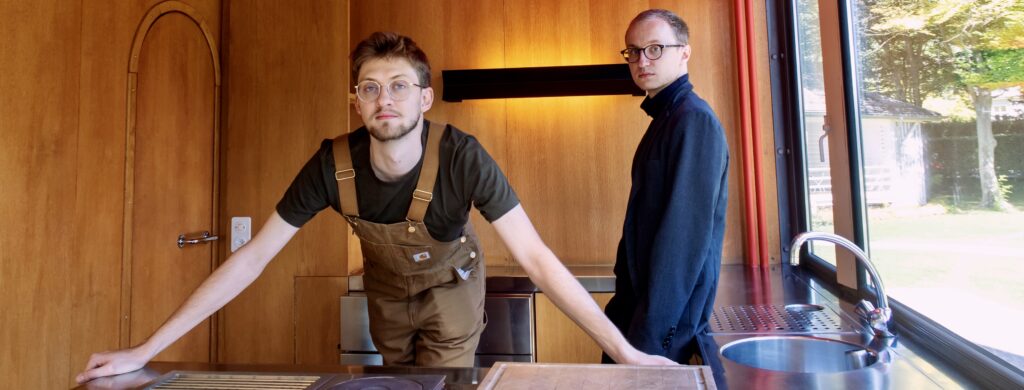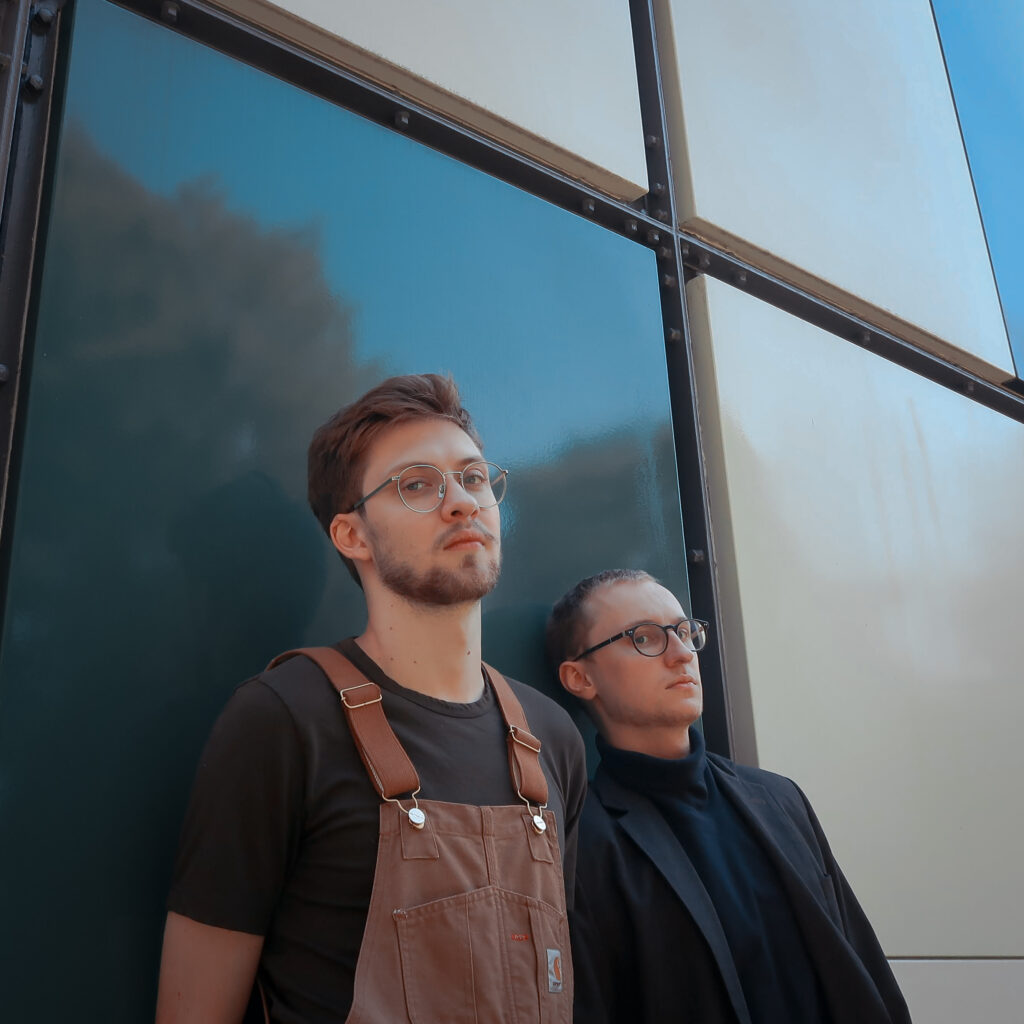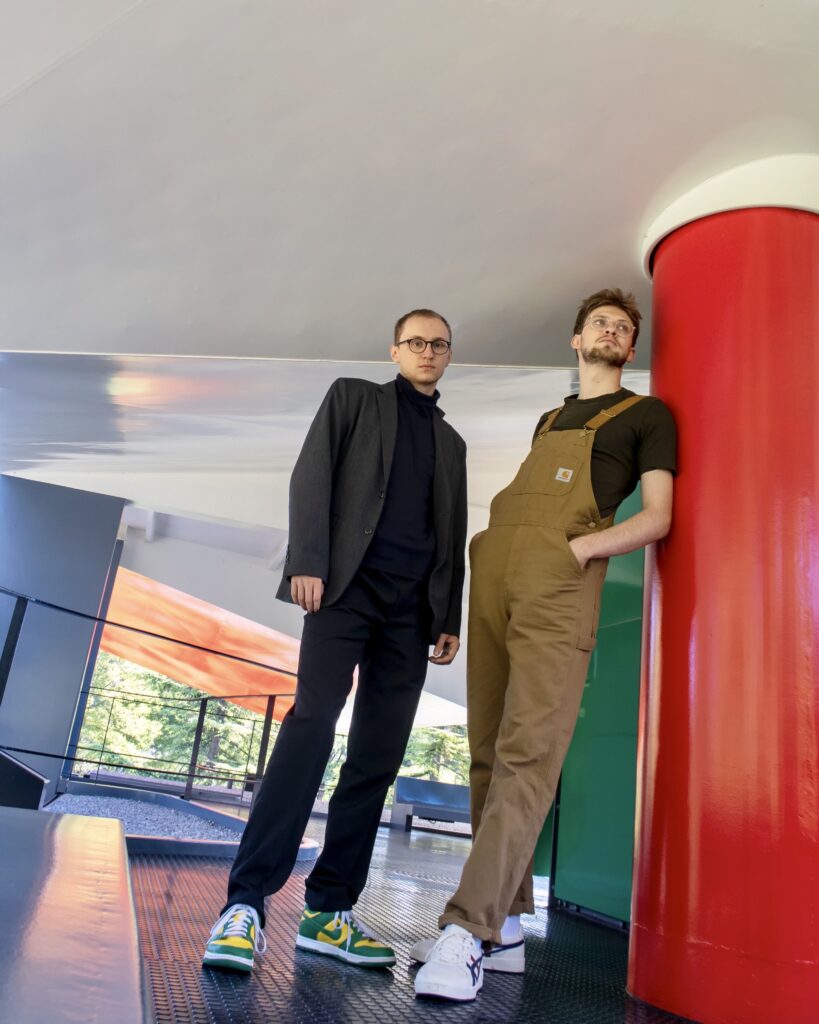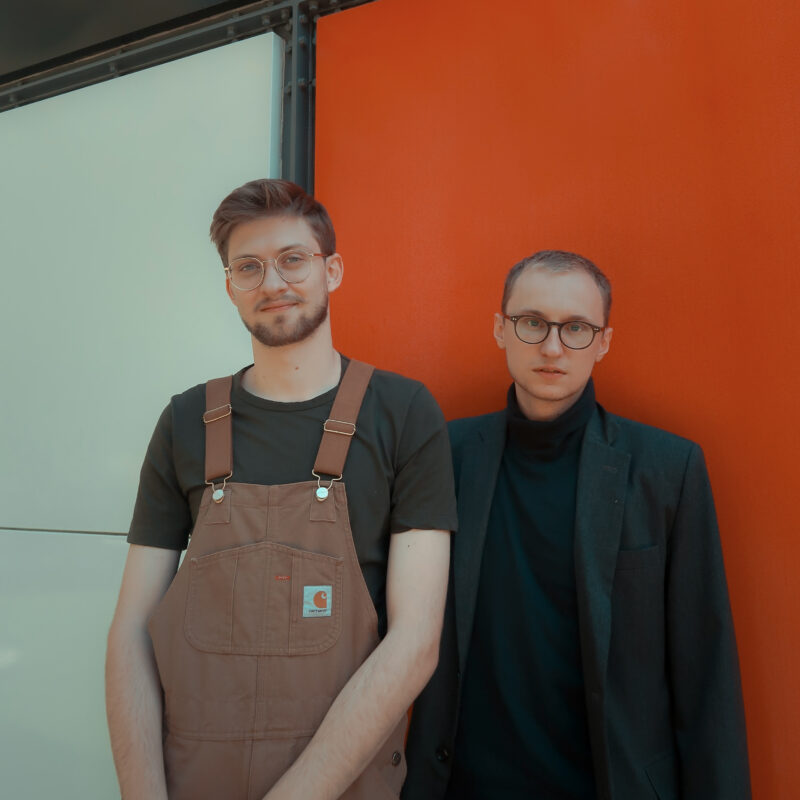Swiss duo LONER LAWRENCE talk to KATIE MCCLUNG about the release of their first album, the imminent creation of their second, and the unravelling story of LONER LAWRENCE.
Who is Loner Lawrence?
Tim: I’m Tim and I’m one half of Loner Lawrence. When it started off it was my solo project and Kaim was the producer. We’ve evolved a lot as a band now and at this point we both do everything: producing, writing. I’m still more on the writing side and Kaim’s more on the production and sound design side of the project.
How did you meet?
Kaim: We met in Switzerland about four years ago in Tim’s hometown. It’s a small industrial town. A friend of ours wanted to start a band and connected with both of us, and that’s how we met.
Tim: We’ve always had music as a common denominator.
What have you been up to recently? Where are you at the moment?
Tim: I’m in Switzerland right now in my hometown. I’ve been travelling quite a lot. Shouldn’t be but I have. I’ve been to London and back quite a bit lately trying to sort out all types of stuff with my living situation. That’s been a bit complicated. Otherwise, working on my dissertation and trying to finish the second Loner Lawrence album.
Kaim: I’m in Amsterdam right now on vacation but I’m usually in Switzerland. I’ve been mainly working on music these last few weeks.

Your first album Anathema is Easy was released just as coronavirus lockdown hit, how was that experience for you?
Tim: It was quite surreal. We actually wanted to release it on March 17th which is my birthday, I was sort of gifting myself an album, but our distributor took longer than expected so it came out a little bit later. It was quite an intense time. About two weeks prior to lockdown, Kaim came to London and we spent a week mixing and mastering everything in my six-square-metre bedroom. We just wanted to finish it because we thought we wouldn’t be able to see each other again for a long time. Then pretty much a week later, I was coming home to Switzerland because of COVID and there was a full lockdown. We hadn’t planned it, but at that point, we just released the album anyway. In some ways, I think we didn’t really mind because the album is quite sombre, so it kind of captured the mood.
What is your writing process like as a duo? Do often create together over the internet or do you manage to meet up and do it in person?
Kaim: It’s a mix. Two months ago we met up and booked a studio here in Switzerland for six days. Other times we just send each other music over email.
Tim: I think an important part of our process is that we don’t just send each other the music that we make, but also stuff that we have heard and liked. It’s a way of long-distance calibration of what we’re into, what we’re listening to right now, and what we enjoy. Then when we do make music together, there’s a strong sense of what we’re enjoying right now and what we want to do. Otherwise, as Kaim said, a lot of it is just us recording locally and sending it to the other person. I think we really had to get used to that because we both have very different ways of creating on the computer when we use Ableton. I’m very messy because I’m very impulsive. I’ll start doing something, not name anything, and record a track within about half an hour and send it to Kaim. Kaim will be having a mental breakdown because he has to rename all the tracks to find out what’s going on. He’s taught me how to be a bit more orderly…
Kaim: It’s the same in the studio because he just picks up an instrument and records something, and then picks up another instrument and records something and in the end we have about forty tracks and only twenty of them are usable.
Do you play a lot of the instruments yourself or do you use virtual instruments/plug-ins?
Kaim: 50/50 probably.
Tim: Drums is normally done on software because its easiest. Although, now that we’ve worked in the studio we’ve got some tracks where we’ve actually recorded the drums ourselves. We had a lot of great microphones and a drum set so why not? But we’re very sloppy drummers.
What instruments do you each play?
Tim: I myself am a guitarist and vocalist really, that’s how it started off for me. And then synthesizers are just a good excuse to say that you can press some keys.
Kaim: For me bass and piano.
Quite a mix between you then. There is a huge array of sounds, instruments and styles throughout Anathema is Easy, what would you say were the main influences on the album?
Tim: That’s quite a difficult question because the first album was mostly me producing the tracks, and then Kaim as co-producer bringing it all together and putting the sound design on it. Those tracks were created over almost two years. It was Kaim who told me to make an album out of it’. Some tracks go really far back. Some were probably influenced by John Hopkins when I was just getting into electronic music. That was me having never heard electronic music before, after being into guitar music for 15 years of my life. Some stuff is really inspired by post-punk or instrumental post-rock bands. I’d like to think that you can always hear a bit of The Cure and bands like that in there. There wasn’t of a conscious process of having inspirations because the timeline is so large on that album.
Kaim: It’s really hard to tell because you bring all of your influences to the song-writing process. So it’s probably a lot of things.

You wrote the album in various places across the globe, do you feel that your location affected the sound?
Tim: Most definitely. The album was mainly recorded between three places: at home in my bedroom in Switzerland, in England, and then some in Japan. You can hear with some tracks that they were made very early on when I had just started to record at home. ‘Tokyo in Solitude’ for example is probably one of the very first tracks I ever recorded. Then I made some tracks like “It Won’t be Easy’ in London when I felt a bit more comfortable with recording. There’s a bit of an evolution, the sound has matured.
Kaim: I think the stuff you recorded in Japan is more inspired by electronic music. Those tracks are more electronically infused where the stuff you recorded in England is very guitar-heavy.
Tim: That’s true come to think of it. It’s quite difficult to say because there were different moods across the time and places in which the album was recorded. The album itself is sort of a post-mortem album, but the only post-mortem part was actually when I went to Japan; I was in mourning and I was recording some tracks there. Incidentally, a lot of tracks just happen to fit into that mood and work together despite being made prior to the incident. I don’t know how it all ties together but it works.
Anathema is Easy deals with some very personal themes, are you comfortable putting such raw feelings out into the world?
Tim: I think I’m comfortable with it. We will be comfortable with it when the second album comes out because in our sound aesthetic the voice is quite far removed. They’re not really lyrics, the emotional value comes from the entire feeling of the tracks. We create a lot based on feelings and emotions, which is highly open to interpretation. I like to think that we keep things, to a certain extent, slightly enigmatic, whether that be the name of the album, the track, or the whole ‘Loner Lawrence’ character that we’ve created for the project. In a certain way, it is deeply personal but it’s really up to the listener to decide what they want to make from it. We’re not spoon-feeding people anything.
Kaim: I on the other hand think it’s extremely weird to put our personal stuff out. But if you do, you have to commit to it.
You’re already working on a second album, was this spurred on by lockdown?
Kaim: This one actually started in lockdown. Almost every song was newly written
during our studio time.
Tim: Everything has pretty much happened over the last few months. Not everything happened in the studio, we recorded some bits alone during lockdown. It’s pretty much a lockdown album.
Lockdown was a very introspective experience for many people, did this influence your writing in any way?
Tim: I think so. It’s difficult to tell. This album is quite different from what we’ve done in the past because we were actually in the studio together, producing together, with ideas bouncing off each other. We booked the studio for six days without having written anything; we just walked in and messed about and came out with six or seven tracks to show for it. Subconsciously, I think it was an introspective experience. Sometimes I listen back to some of the demos we have and I can identify certain parts with certain stages of the lockdown. But because it was incredibly impulsive, the way things happened, it was not necessarily conscious in the moment of creation.
Did you feel the pressure to be productive during all the extra time?
Tim: We had a couple of studio bust-ups. There was some pressure, but mostly because we’d paid for the studios. We had a couple of really low moments where nothing was working and Kaim was visibly annoyed at me, and I was annoyed at him.
Kaim: Fun times.
Tim: They were great times. Funnily enough, one track that we absolutely love came from both of us being really frustrated and each doing our own thing in the studio. We just started jamming and recorded a track which is probably still one of my favourites now. That came out of really feeling like nothing was going to happen for the rest of the day. We did have some days where we were incredibly efficient and we just didn’t feel the pressure to perform in the studio and record.

You cited ‘modern dance music and glitchy lo-fi hip hop sampling techniques’ as influences for the second album, how will the second album differ from the first in terms of sound?
Kaim: It’s more danceable.
Tim: In the first section of our studio time, we spend considerable amounts of time listening to LCD Soundsystem, and that really influenced our want to make it more ‘dancey’. We really wanted it to be more groovable. We love the guy [James Murphy], we love his music. We listen to other tracks and try and think about what we like about them. That influenced a lot of the danceability in some of the tracks. So that’s one of the things that’s changed. Otherwise our approach to recording drums; we’ve been using more sampling techniques where we take pre-recorded drums, splice them up, and then rearrange them the way we want. JPEGMAFIA really inspire me to be more creative with the rhythm section.
Generally in our approach its always about finding unique sounds and creating sounds yourself. There are a lot of producers out there who might sound the same because they’re using the same plug-in instruments; whereas we are trying to use synthesisers to create the sounds ourselves, or really playing around and recording soundbites to warp and squeeze them into new things. To make something you’ve never heard before, that’s incredibly exciting.
Do you play your music live?
Kaim: We had a gig with our old band at an old gas station a few years ago. Right now we’re preparing our live set for the future.
Tim: We’ve been booked for a really exciting festival in Switzerland. It’s the swiss version of Great Escape but smaller. We really want to put on a great live set there. So next week is going to be a headache, we really need to work out how to make it work.
Kaim: We’re going to hate each other’s guts.
Tim: We want it to be a really modern, interactive experience.
You’re from Switzerland, but you’re thought of as a “London act”. Do you feel that this is true?
Tim: We’re definitely seen as a “London band” in Switzerland, which is seen as something exotic or exciting. For all the wrong reasons it is thought of as something better than what’s going on in Switzerland, which is most definitely not true. But it is something that’s inherently marketable. We’ve been told that we should market ourselves as from London because that’s what the people in Switzerland want. London is just a big place, so it’s really difficult to “make it” to any extent with music in London. We have quite a lot of contacts in the swiss music industry, it’s small so its relatively easy to achieve something. I don’t think so far we’ve done anything with music in London but I’m hoping we can change that with the second album.
Tim: We’re Swiss and English and to be honest I think, at the end of the day, we don’t care where we come from.
What are your plans for the future of Loner Lawrence?
Tim: I think we’re going to just stop making music and sell t-shirts instead.
Kaim: There’s more money in that.
Tim: We released some t-shirts and they flew off the hanger in no time. So we’ve spent quite a lot of time now just focusing on getting more t-shirts.
Kaim: We’re going to be focusing on new music and live gigs and everything that comes with playing music. Having fun mainly.
Tim: After album three we’ve got album four coming, and then album five. We’re just going to keep churning out music and if people listen, that’s great. And if they don’t, then we’ve still got the album right?
You can find Loner Lawrence on Instagram at @loner_lawrence. Their album Anathema is Easy is now available to stream on Spotify and Bandcamp.
Featured image courtesy of Loner Lawrence.





